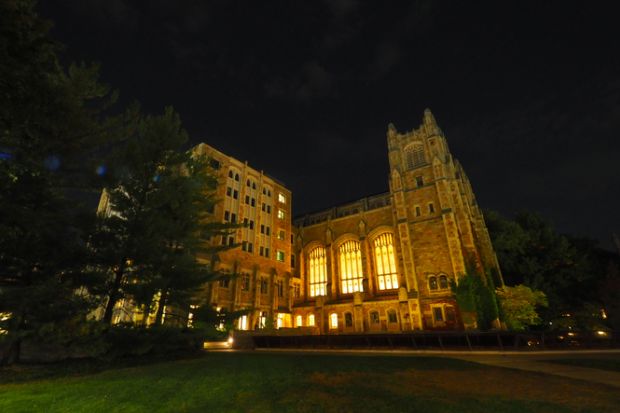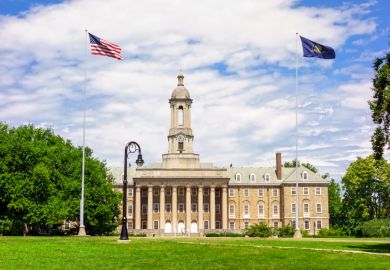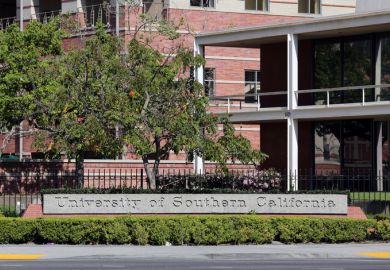The University of Michigan has accepted a $490 million (£360 million) settlement with more than 1,000 victims of a sports doctor who sexually abused them during routine medical examinations over a four-decade career.
The doctor, Robert Anderson, worked at the university from 1966 to 2003, served as head of the university health service and as team physician in multiple sports, and died in 2008 without ever being prosecuted.
As in high-profile cases such as those of Larry Nassar at Michigan State University and Richard Strauss at Ohio State University, officials at the University of Michigan were understood to have been warned about Dr Anderson’s sexual assaults but did not stop him.
By finally accepting responsibility for that, said Jamie White, an attorney representing nearly 100 of Dr Anderson’s victims, the University of Michigan “should be commended and not condemned”.
“Most of our clients had a strong love for the university and did not want to see permanent damage, but wanted accountability,” Mr White said in a statement outlining the settlement. “I believe we accomplished those goals.”
The $490 million agreement still needs approval by the federal court that has been overseeing the negotiating process since October 2020, by the university’s Board of Regents, and by most of the victims. The victims’ attorneys have recommended that the agreement, in order to be considered ratified, be endorsed by 98 per cent of the 1,050 claimants.
The university said it has no role in the allocation of the settlement money but understands that $460 million of the amount will be divided among the participating claimants, with $30 million left for any future claimants who step forward by July 2023.
The University of Michigan’s failures with regard to Dr Anderson were outlined in an outside investigation that the institution commissioned and released last May after a year of interviews with hundreds of former patients and staff.
The report, by the law firm Wilmer Cutler Pickering Hale and Dorr, included the finding that Dr Anderson was moved to the university’s athletics department in 1981 after credible reports of his sexual misconduct were made to the institution’s top leadership.
In releasing that report, Michigan’s president at the time, Mark Schlissel, offered the university’s “heartfelt apology for the abuse perpetrated by the late Robert Anderson”.
Professor Schlissel, however, was fired just this past week after the university investigated allegations that he engaged in a sexual relationship with an employee.
His predecessor and temporary successor as Michigan president, Mary Sue Coleman, called the settlement with Dr Anderson’s victims “a critical step among many the university has taken to improve support for survivors and more effectively prevent and address misconduct”.
In the case of Dr Nassar, Michigan State agreed in 2018 to pay $500 million to settle claims from more than 300 women and girls. The University of Southern California last year agreed to pay about $850 million to more than 700 women allegedly victimised by campus gynaecologist George Tyndall. Ohio State University has agreed in the past two years to pay nearly $47 million to 185 victims of Dr Strauss, a sports team doctor. Pennsylvania State University agreed in 2017 to pay about $100 million to some 35 victims of football coach Jerry Sandusky.
While Mr White spoke positively of the University of Michigan’s accountability on behalf of his clients, other victims of Dr Anderson have suggested the ousting of Professor Schlissel as Michigan president indicates a problematic culture that still has not been properly addressed. After the firing was announced, more than 100 students gathered outside the president’s house to protest the abuse of power that they perceived his behaviour as representing.
At least two former Michigan football players who describe themselves as victims of Dr Anderson, Chuck Christian and Jonathan Vaughn, had already been outside the presidential house since October, in a sit-in protest. Mr Christian has a late-stage cancer diagnosis that he attributes to a fear of doctors, and has said he knows of many other victims in similar circumstances of untreated diseases.
Register to continue
Why register?
- Registration is free and only takes a moment
- Once registered, you can read 3 articles a month
- Sign up for our newsletter
Subscribe
Or subscribe for unlimited access to:
- Unlimited access to news, views, insights & reviews
- Digital editions
- Digital access to THE’s university and college rankings analysis
Already registered or a current subscriber? Login








